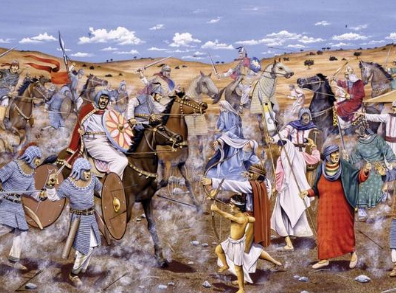The Arab Empire, once a glorious empire, spanned across Asia, Europe, and Africa during its heyday, becoming one of the most powerful empires in the world. However, as history rolls forward, the Arab Empire could not escape the fate of decline. So, who destroyed the Arab Empire and how did it happen? This article will reveal this historical mystery for you.

Firstly, the downfall of the Arab Empire mainly refers to the Mongol Empire's conquest of the Abbasid dynasty of the Arab Empire in 1258 AD. This battle, known as the "Battle of Baghdad," was part of the Mongol Empire's western campaign and the crucial battle that led to the demise of the Arab Empire.
Secondly, the Mongol Empire was a vast empire that once extended its territory to eastern Europe, West Asia, Central Asia, and East Asia. Under the leadership of Genghis Khan and his descendants, the Mongol army, with its formidable combat strength and superb warfare strategies, conquered countless countries and nations.
In 1258 AD, Hulagu Khan of the Mongol Empire led a large army to attack Baghdad, the capital of the Arab Empire. After several months of fierce battles, the Mongol army finally captured Baghdad and killed the Abbasid caliph Mustasim. This battle marked the fall of the Arab Empire.
Thirdly, the decline of the Arab Empire did not happen overnight but gradually occurred under prolonged internal conflicts and external pressures. Under the rule of the Arab Empire, Islam split into Sunni and Shia factions, leading to escalating internal conflicts. Simultaneously, the Arab Empire's trade relations with other countries were severely affected, especially with Europe, where commercial ties were almost severed.
Moreover, the rise of the Mongol Empire posed a significant threat to the Arab Empire. The Mongol army swiftly conquered most of the Asian continent, including the western territories of the Arab Empire. This resulted in a significant reduction in the Arab Empire's territory and a sharp decline in its national strength.
Fourthly, despite its demise, the Arab Empire left a profound impact on history. Its achievements in science, culture, and art have had far-reaching effects on subsequent generations. For instance, Arab scholars translated numerous works from ancient Greece, Rome, and India, laying the foundation for scientific development during the European Renaissance. Additionally, Arabic numerals and algebra are significant contributions of the Arab Empire.
In conclusion, the Arab Empire was destroyed by the Mongol Empire, primarily due to internal religious conflicts and external threats from the Mongol Empire. Although the Arab Empire has perished, its cultural legacy continues to influence the world.
Disclaimer: The above content is sourced from the internet and the copyright belongs to the original author. If there is any infringement of your original copyright, please inform us and we will delete the relevant content as soon as possible.































